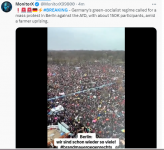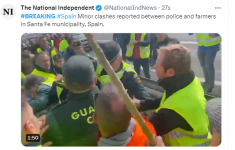You are using an out of date browser. It may not display this or other websites correctly.
You should upgrade or use an alternative browser.
You should upgrade or use an alternative browser.
INTL German Farmers Begin 8 Day Massive Protest Against Increased Government Taxation and Alarmist Climate Agenda
- Thread starter Plain Jane
- Start date
Sell your tractors and buy guns.
from what I see in the above photos a mob that big can over run the security and kill off the offending government that wants to kill them.
Last edited:
Knoxville's Joker
Has No Life - Lives on TB
yuppers. And the issue is the folks don't realize that.from what I see in the above photos a mob that big can over run the security and kill off the offending government that wants to kill them.
Plain Jane
Just Plain Jane
Sundance is going to Poland to check things out.
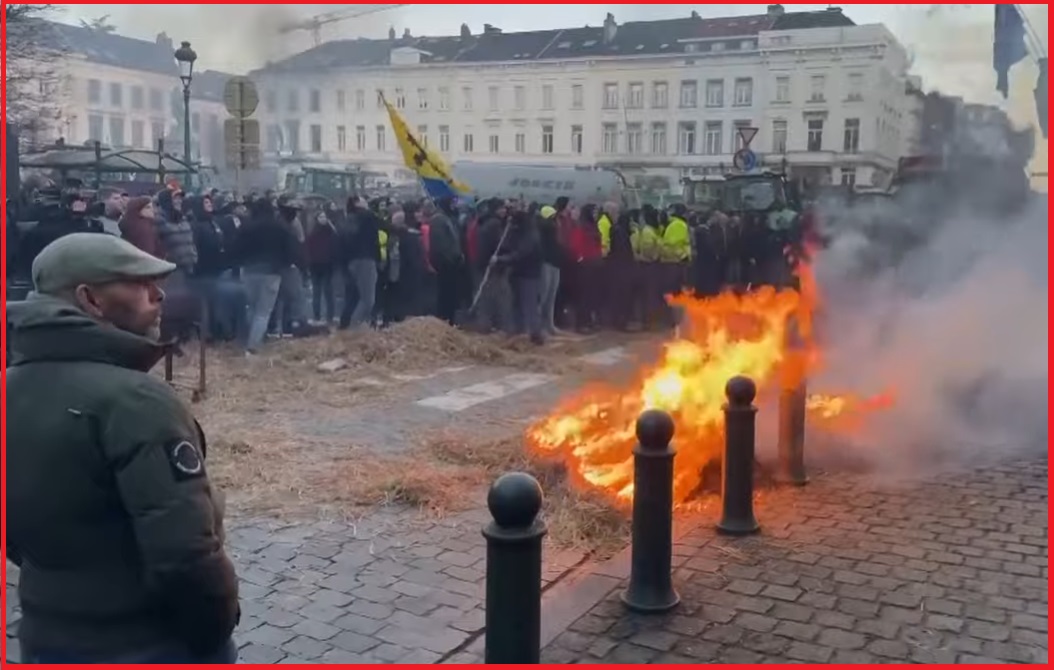
 theconservativetreehouse.com
theconservativetreehouse.com
February 3, 2024 | Sundance | 179 Comments
Things are getting very interesting in the EU, specifically the nations with significant uprisings of farmers and truckers.
Adipolo
 What I find interesting in this Reuters story, is the first time one of the MSM publications has been willing to identify the true intent of the protests.
What I find interesting in this Reuters story, is the first time one of the MSM publications has been willing to identify the true intent of the protests.
WARSAW, Feb 2 (Reuters) – Polish farmers from the Solidarity trade union plan a general strike starting next Friday with a blockade of border crossings between Poland and Ukraine, it said, joining similar protests, opens new tab all over Europe.
Farmers in France, Belgium, Portugal, Greece and Germany have been protesting against the constraints placed on them by EU measures to tackle climate change, as well as rising costs and unfair competition from abroad. Polish farmers have been particularly vocal about the impact of cheap food imports from neighbouring Ukraine.
“Our patience has run out. Brussels’ position on the last day of January 2024 is unacceptable for our entire agricultural community,” the trade union said in a statement dated Thursday.
“Additionally, the passivity of the Polish authorities… regarding the import of agricultural produce and food products from Ukraine leave us with no other choice but to declare a general strike.”
The European Commission said it was listening closely to the concerns expressed by farmers in protests taking place in several member states. (read more)
I arrive in Poland at noon tomorrow… I’ll let you know what I find, and what comes next…
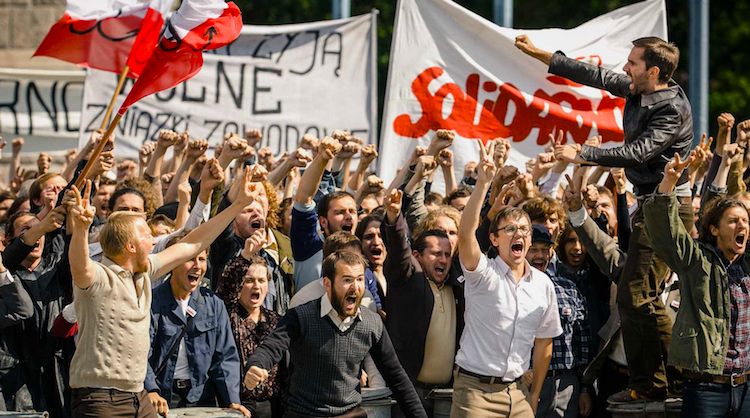

Polish Farmers Plan Solidarity General Strike for Next Friday - The Last Refuge
Things are getting very interesting in the EU, specifically the nations with significant uprisings of farmers and truckers. What I find interesting in this Reuters story, is the first time one of the MSM publications has been willing to identify the true intent of the protests. WARSAW, Feb 2...
Polish Farmers Plan Solidarity General Strike for Next Friday
February 3, 2024 | Sundance | 179 Comments
Things are getting very interesting in the EU, specifically the nations with significant uprisings of farmers and truckers.
Adipolo
 What I find interesting in this Reuters story, is the first time one of the MSM publications has been willing to identify the true intent of the protests.
What I find interesting in this Reuters story, is the first time one of the MSM publications has been willing to identify the true intent of the protests.WARSAW, Feb 2 (Reuters) – Polish farmers from the Solidarity trade union plan a general strike starting next Friday with a blockade of border crossings between Poland and Ukraine, it said, joining similar protests, opens new tab all over Europe.
Farmers in France, Belgium, Portugal, Greece and Germany have been protesting against the constraints placed on them by EU measures to tackle climate change, as well as rising costs and unfair competition from abroad. Polish farmers have been particularly vocal about the impact of cheap food imports from neighbouring Ukraine.
“Our patience has run out. Brussels’ position on the last day of January 2024 is unacceptable for our entire agricultural community,” the trade union said in a statement dated Thursday.
“Additionally, the passivity of the Polish authorities… regarding the import of agricultural produce and food products from Ukraine leave us with no other choice but to declare a general strike.”
The European Commission said it was listening closely to the concerns expressed by farmers in protests taking place in several member states. (read more)
I arrive in Poland at noon tomorrow… I’ll let you know what I find, and what comes next…

Knoxville's Joker
Has No Life - Lives on TB
Question, with production all eaten up at the moment, how long before the enforcers run out of rubber bullets and tear gas?
mzkitty
I give up.
Question, with production all eaten up at the moment, how long before the enforcers run out of rubber bullets and tear gas?
Not a problem -- then it will be time for lead.

Babs
Veteran Member
Like I said. Sell your tractors and buy guns and bullets.
Knoxville's Joker
Has No Life - Lives on TB
They can't, not like you can here...Like I said. Sell your tractors and buy guns and bullets.
Babs
Veteran Member
They can't, not like you can here...
But I'm not talking about them.
Knoxville's Joker
Has No Life - Lives on TB
Ah, clarity helps explain the statement better.But I'm not talking about them.
Plain Jane
Just Plain Jane
France Caves To Farmers As Ireland 'Solidarity' Protests Kick Off | ZeroHedge
ZeroHedge - On a long enough timeline, the survival rate for everyone drops to zero
France Caves To Farmers As Ireland 'Solidarity' Protests Kick Off
BY TYLER DURDEN
SATURDAY, FEB 03, 2024 - 10:45 PM
Two of France's main farming unions on Thursday agreed to suspend protests and lift road blockades across the country after the government announced measures the deemed "tangible progress" in the ongoing revolt against EU 'climate-driven' initiatives designed to wean society off of evil, non-bug-based, carbon-emitting food while China, India, and the rest of the world laughs.
R/T 3:33
n addition to France, protests have been held in Belgium, Portugal, Greece, Germany and elsewhere. Last week, tensions came to a head in Brussels when farmers threw eggs and stones at the European Parliament building, demanding that European leaders stop punishing them with more taxes and rising costs to finance the so-called 'green agenda.'
After French farmers stepped up protests earlier in the week, the government promised on Thursday to extend protections - including better controlling imports and giving farmers additional aid, Reuters reports.
"Everywhere in Europe the same question arises: how do we continue to produce more but better? How can we continue to tackle climate change? How can we avoid unfair competition from foreign countries?," said Prime Minister Gabriel Attal, announcing the new measures.
In response, France's main farmers union, FNSEA, announced that it was time to lift the blockades and "go home." Arnaud Gaillot of the Young Farmers' union echoed the message, however both unions warned that other types of protests would continue, and they'd be back if the government doesn't make good on their promises.
Meanwhile in Ireland, farmers began protesting Thursday evening.
View: https://twitter.com/NationalIndNews/status/1753148755031794051?ref_src=twsrc%5Etfw%7Ctwcamp%5Etweetembed%7Ctwterm%5E1753148755031794051%7Ctwgr%5Efed18cc13a74c4bd82ddee3db37118411b239517%7Ctwcon%5Es1_&ref_url=https%3A%2F%2Fwww.zerohedge.com%2Fgeopolitical%2Ffrance-caves-farmers-ireland-solidarity-protests-kick
"There’s a general dissatisfaction with the level of environmental regulation that is being heaped on farmers, the low margins, and (the) resulting low income the farmers have been suffering from for a very long time now," said Cathal MacCarthy, media director for the Irish Creamery Milk Suppliers Association, adding "There will be a great deal of sympathy and solidarity with the aim and ambitions of the protests both in Ireland and on the Continent," EURACTIV reports.

"They feel they are being regulated out of business by Brussels bureaucrats and Department of Agriculture officials who are far removed from the reality of day-to-day farming," said Irish Farmers’ Association (IFA) President Francine Gorman on Wednesday, ahead of the protests.
"We can either continue to have cheap food, or we can have environmentally sustainable food, but we can’t have both," said MacCarthy.The concerns of the Irish beef and dairy farmers echo the concerns of other European farmers who have been protesting for weeks.
MacCarthy said Irish beef and dairy farmers also believe they are not being compensated fairly for the agrifood products they cultivate, given the increased costs involved in production as a result of environmental regulations.
“We need senior politicians to face consumers and say, ‘Lads, listen, the cost of producing this food is X, that has to be paid, and the margin that allows farmers to live (has to be paid), but we can’t just be dependent on what the supermarket feels like charging their customers,’” he said. -EURACTIV
StarryEyedLad
désespéré pour le ciel
Babs
Veteran Member
Dramatic Scenes At EU Parliament | Fire & Tractor Barricades As Belgian Farmers Scale Up Protests
Plain Jane
Just Plain Jane
Polish Farmers Plan General Strike, Blockade Of Ukraine Border | ZeroHedge
ZeroHedge - On a long enough timeline, the survival rate for everyone drops to zero
Polish Farmers Plan General Strike, Blockade Of Ukraine Border
BY TYLER DURDEN
MONDAY, FEB 05, 2024 - 02:00 AM
Authored by Ella Kietlinska via The Epoch Times (emphasis ours),
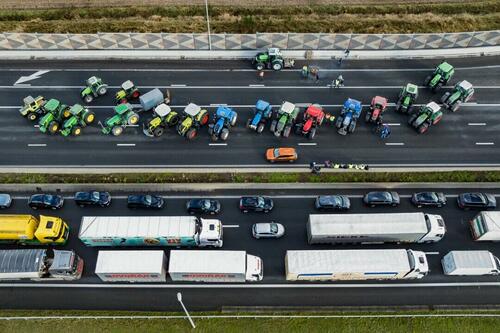 A aerial view shows trucks and tractors blocking the E40 highway during a farmer's protest, in Aalter, Belgium on January 31, 2024. (Kurt Desplenter/AFP via Getty Images)
A aerial view shows trucks and tractors blocking the E40 highway during a farmer's protest, in Aalter, Belgium on January 31, 2024. (Kurt Desplenter/AFP via Getty Images)Polish farmers from the Solidarity trade union plan a general strike starting this Friday with a blockade of border crossings between Poland and Ukraine, joining similar protests all over Europe.
The presiding officers of the farmers’ trade union “Solidarity” unanimously adopted a resolution on Wednesday announcing a general strike of farmers throughout the country, according to a union’s statement.
The strike will begin on February 9 with a blockade of all border crossings between Poland and Ukraine, along with blockades of roads and highways across the country between Feb. 9 and March 10, the trade union said in the statement on Thursday.
“Our patience has run out. Brussels’ position on the last day of January 2024 is unacceptable for our entire agricultural community,” the trade union said in the statement.
“Additionally, the passivity of the Polish authorities... regarding the import of agricultural produce and food products from Ukraine leave us with no other choice but to declare a general strike.”
Solidarity also demanded that the Polish government ensure the profitability of Polish agriculture and rebuild the Polish agro-processing sector, as, in its opinion, they are not protected under the “European Green Deal,” which is currently being implemented.
“Polish family farms are the basis of the country’s food security,” the trade union said. “We are fighting for our common good, which is to protect Polish family farms, often multi-generational farms, from collapse and bankruptcy.”
The European Green Deal is the European Union’s initiative to fight climate change and environmental degradation, which the EU considers “an existential threat to Europe and the world,” according to a policy statement by the European Commission.
“The European Commission [the EU’s executive body] has adopted a set of proposals to make the EU’s climate, energy, transport, and taxation policies fit for reducing net greenhouse gas emissions by at least 55 percent by 2030, compared to 1990 levels.” with the ultimate goal of “no net emissions of greenhouse gases by 2050,” the statement said.
Farmers in France, Belgium, Portugal, Greece, and Germany have been protesting against the constraints placed on them by EU measures to tackle climate change, rising costs, and unfair competition from abroad. Polish farmers have been particularly vocal about the impact of cheap food imports from neighboring Ukraine.
Reactions to Protest Announcement
The European Commission said it was listening closely to the concerns expressed by farmers in protests taking place in several member states.“In relation to the specific concerns outlined by farmers at the present time, the Commission is assessing possible next steps,” a spokesperson for the Commission wrote in an emailed response to Reuters’ request for comment.
Polish Minister of Agriculture Czesław Siekierski said in an interview with RMF FM on Saturday that the Polish government would try to stop blockades of roads, and it has already asked the farmers’ trade unions for a meeting.
Mr. Siekierski told RMF FM that farmers” are protesting for a good cause” as grain exported from Poland is pushed out from markets by cheaper grain from Ukraine.
The government has been conducting bilateral talks with Ukraine and is also in talks with the EU, but it needs more time because it took office only seven weeks ago, Mr. Siekierski told RMF FM.
Former Polish minister of agriculture Artur Balazs and Chairman of the European Fund for the Development of Polish Villages said in an interview with “Polskie Radio 24” that agricultural production in Ukraine does not comply with EU’s phytosanitary and animal welfare regulations.
For the EU farmers, however, compliance with the Union’s agricultural standards amounts to a large portion of production costs, Mr. Balazs told the Polish radio station, adding that only the EU can solve this problem.
EU Greening Concession
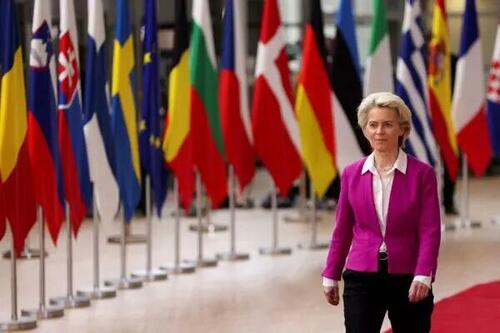 European Commission President Ursula von der Leyen arrives for the European Union leaders summit in Brussels, Belgium, on May 30, 2022. (Johanna Geron/Reuters)
European Commission President Ursula von der Leyen arrives for the European Union leaders summit in Brussels, Belgium, on May 30, 2022. (Johanna Geron/Reuters)On January 31, the European Commission proposed to allow EU farmers to derogate for one year from certain EU agricultural rules adopted in 2023, according to a statement.
The EU’s rule that obligates farmers to keep 4 percent of their arable land fallow or unproductive is set to be temporarily replaced by a rule requiring farmers to allocate 7 percent of their land to growing, without using pesticides, nitrogen-fixing crops– such as lentils, peas, or favas– and catch crops, the statement said. “Catch crops are plants that grow between two main crops” and can serve as fodder for animals or green manure.
Farmers who follow the new rule will still be eligible for EU’s subsidies, the statement said.
The European Commission recognized in the statement the difficulties and uncertainties framers face due to weather events such as droughts, wildfires, and floodings in various parts of the Union, high energy and input prices due to the Russian invasion of Ukraine, as well as inflation and increased costs of living.
“Today’s measure offers additional flexibility to farmers at a time when they are dealing with multiple challenges,” Ursula von der Leyen, President of the European Commission, said in the statement.
Copa and Cogeca, the organization of the EU’s farmers and agri-cooperatives, said in a statement that the EU’s decision to allow farmers to derogate from keeping a portion of their land fallow or unproductive came late in the agricultural calendar and is limited.
According to the European Commission, the measure will be adopted upon its approval by EU members through voting.
Copa and Cogeca called in the statement on EU member states to “further strengthen this proposal.”
Capping Imports From Ukraine
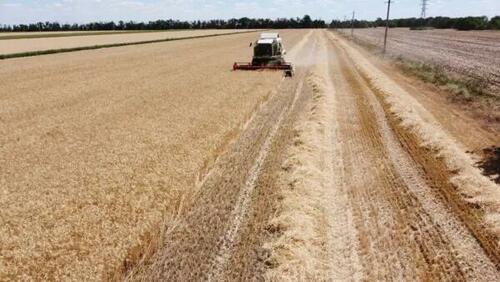 An aerial picture taken on July 21, 2022, shows a combine harvester in a wheat field near Mykolaiv amid the Russian invasion of Ukraine. (Photo by Ionut Iordachescu/AFP via Getty Images)
An aerial picture taken on July 21, 2022, shows a combine harvester in a wheat field near Mykolaiv amid the Russian invasion of Ukraine. (Photo by Ionut Iordachescu/AFP via Getty Images)On the last day of January, the European Commission also proposed to renew the suspension of import duties and quotas on Ukrainian exports to the EU for another year but to cap the import of sensitive agricultural products from Ukraine—poultry, eggs, and sugar–at levels from 2022 and 2023, according to a statement.
If imports of these products exceeded the average import volumes in 2022 and 2023, “tariffs would be reimposed to ensure that import volumes do not significantly exceed those of previous years,” the statement said.
The EU lifted import duties on Ukrainian exports in 2022 following Russia’s invasion, the Commission said.
The measure proposed by the EU to create a mechanism to limit the rising imports of some foods is welcomed by Copa and Cogeca, but its members found it insufficient, the organization said in a statement.
Copa and Cogeca said that excluding cereals and oilseeds from the mechanism limiting imports from Ukraine is “unacceptable.”
“While we believe that it is in the EU’s duty and interest to continue supporting Ukraine, the solution to the current situation concerning the impact of the imports on EU producers must be effectively addressed,” Copa and Cogeca said.
The statement said that the EU’s two legislative bodies, the European Parliament and the Council of the European Union, comprised of ministers from each member country, will consider the proposal.
The organization called on both institutions to include cereals and oilseeds in the measure and use the yearly average of the two earlier years—2021 and 202—as the base to cap the imports from Ukraine.
Copa and Cogeca also demanded that any products imported above this threshold must be exported outside the EU.
Reuters contributed to this report.
ainitfunny
Saved, to glorify God.
The citizens and FARMERS know you die MUCH faster from a politically manufactured FAMINE, than global warming!
Plain Jane
Just Plain Jane
I'm not sure where Sundance is going with this but hope is there.
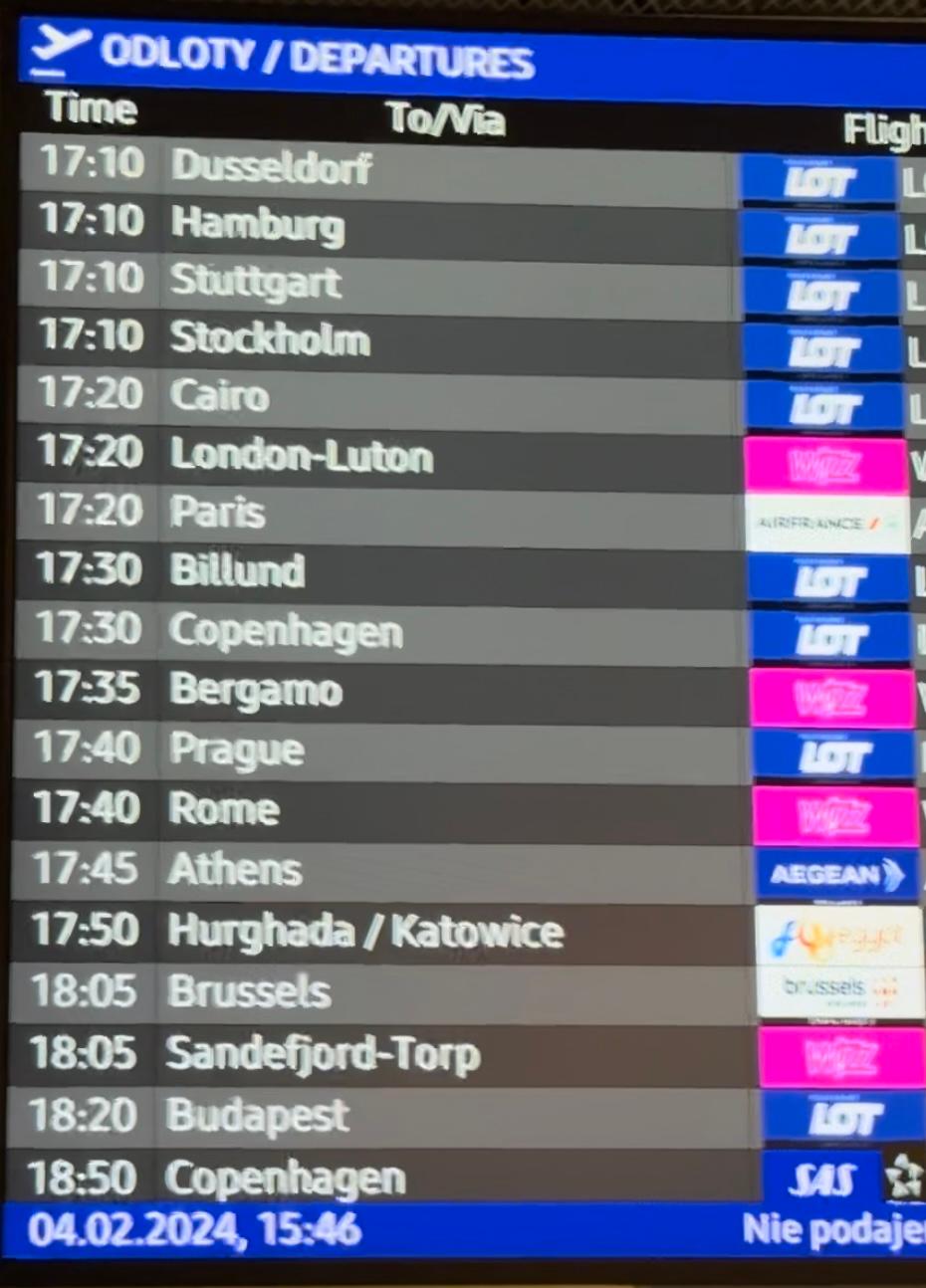
 theconservativetreehouse.com
theconservativetreehouse.com
February 5, 2024 | Sundance | 105 Comments
I will be providing and update later tonight.

The principal elements guiding the organization, which have further possibilities beyond the EU, are similar to the Solidarity movement.


EU PROTEST Update - The Last Refuge
I will be providing and update later tonight. The principal elements guiding the organization, which have further possibilities beyond the EU, are similar to the Solidarity movement. “You never know how strong you are, until being strong is your only option” Posted in Uncategorized Sharemore
EU PROTEST Update
February 5, 2024 | Sundance | 105 Comments
I will be providing and update later tonight.

The principal elements guiding the organization, which have further possibilities beyond the EU, are similar to the Solidarity movement.
“You never know how strong you are, until being strong is your only option”

Plain Jane
Just Plain Jane
EU scraps pesticide proposals in another concession to protesting farmers
The European Union’s executive arm is shelving an anti-pesticides proposal in yet another concession to farmers after weeks of protests blocked major capitals and economic lifelines across the 27-nation bloc.
EU scraps pesticide proposals in another concession to protesting farmers
BY RAF CASERT
Updated 5:57 AM EST, February 6, 2024
Share
BRUSSELS (AP) — The European Union’s executive arm shelved an anti-pesticides proposal Tuesday in yet another concession to farmers after weeks of protests blocked major capitals and economic lifelines across the 27-nation bloc.
Although the proposal had languished in EU institutions for the past two years, the move by European Commission President Ursula von der Leyen was the latest indication that the bloc is willing to sacrifice environmental priorities to keep the farming community on its side.
Farmers have insisted that measures like the one on pesticides would only increase bureaucratic burdens and keep them behind laptops instead of farming, adding to the price gap between their products and cheap imports produced by foreign farmers without similar burdens.
The pesticides “proposal has become a symbol of polarization,” von der Leyen told the European Parliament in Strasbourg, France. ”To move forward, more dialogue and a different approach is needed.”
She acknowledged that the proposals had been made over the heads of farmers.
“Farmers need a worthwhile business case for nature-enhancing measures. Perhaps we have not made that case convincingly,” von der Leyen said.
It is unclear when new proposals will be drafted. EU parliamentary elections are set for June, and the plight of farmers has become a focal point of campaigning, even pushing climate issues aside over the past weeks.
Under its much-hyped European Green Deal, the EU has targeted a 50% cut in the overall use of pesticides and other hazardous substances by 2030. The proposal was criticized both by environmentalists who claimed it would be insufficient to reach sustainability targets, and by agriculture groups who insisted it would be unworkable and drive farmers out of business.
The decision to shelve the proposal on pesticides represented the EU’s latest act of political self-retribution in reaction to protests that have affected the daily lives tens of millions of EU citizens and cost businesses tens of millions of euros due to transportation delays.
Many politicians, especially on the right and its fringes, applauded the impact of the protests.
“Long live the farmers, whose tractors are forcing Europe to take back the nonsense imposed by multinationals and the left,’’ said Italy’s right-wing transport minister, Matteo Salvini.
Last week, von der Leyen announced plans to shield farmers from cheaper products exported from wartime Ukraine and to allow farmers to use some land they had been required to keep fallow for environmental reasons.
The European Commission is set to announce more measures late Tuesday on how to reach its stringent targets to counter climate change. Environmentalists fear their could be more concessions there, too.
In France, where the protests gained critical mass, the government promised more than 400 million euros ($436 million) in additional financial support.
Meanwhile, protests continued in many EU nations.
Since early Tuesday morning, farmers across Spain have staged tractor protests, blocking highways and causing traffic jams to demand of changes in EU policies and funds and measures to combat production cost increases. The protests came as the Agriculture Ministry announced some 270 million euros in aid to 140,000 farmers to address drought conditions and problems caused by Russia’s war against Ukraine.
On Monday night, farmers in the Netherlands blocked several roads and highways with their tractors and torched hay bales and tires.
Police in the rural province of Gelderland said they took action against farmers blocking roads, but there were no immediate reports of arrests.
In recent weeks, farmers have protested from Poland to Greece, and from Ireland over Germany to Lithuania.
___
Mike Corder contributed from The Hague, Ciaran Giles from Madrid and Colleen Barry from Milan.Plain Jane
Just Plain Jane
Bulgaria's farmers are joining Europe-wide protests
Hundreds of angry farmers took to the streets in Bulgaria’s capital to complain of what they call “the total failure” of the government to meet the mounting challenges in the agricultural sector.
Bulgaria’s farmers are joining Europe-wide protests
Updated 11:44 AM EST, February 5, 2024
Share
SOFIA, Bulgaria (AP) — Hundreds of angry farmers took to the streets in Bulgaria’s capital, Sofia, on Monday to complain of what they called “the total failure” of the government to meet the mounting challenges of the agricultural sector.
They called on Agriculture Minister Kiril Vatev to step down for not keeping his promises to ease the administrative burden on the farming sector, to seek state compensation for high costs and falling incomes.
Like their colleagues elsewhere in Europe, Bulgarian farmers are frustrated with domineering European Union regulations, the hardships stemming from the surge in fertilizer and energy costs because of Russia’s war in Ukraine, the increasing imports of farm products that are flooding local markets and the undercutting of prices.
Ventsislav Varbanov, who chairs the Association of Agricultural Producers, complained that the government is adding more undue burdens, instead of seeking some relief for the farmers.
“Let me remind you that our interests were not protected neither as the Ukrainian goods flooded us,” he said, referring to cheaper products exported from Ukraine, “nor had we budget guarantees for the losses we suffered because of the war in Ukraine.”
Varbanov pleaded for a long-term government policy: “We want to know what will be in tomorrow, in the next year, in the next five years.”
Meanwhile, the grain producers’ association announced that its members might join the protests on Tuesday by blocking main roads with their farming vehicles.
The association expressed discontent with a statement made by Prime Minister Nikolay Denkov in response to their demands for compensation that only grain producers who can prove a loss for 2023 will receive financial support. The association wants some form of compensation for all grain producers.
Plain Jane
Just Plain Jane
A new protest is starting in Poland.
 www.zerohedge.com
www.zerohedge.com
BY TYLER DURDEN
WEDNESDAY, FEB 07, 2024 - 02:00 AM
Authored by Paul Joseph Watson via Modernity.news,
Polish farmers are set to join the continent-wide revolt against the EU by launching a massive nationwide strike and blockade later this week.
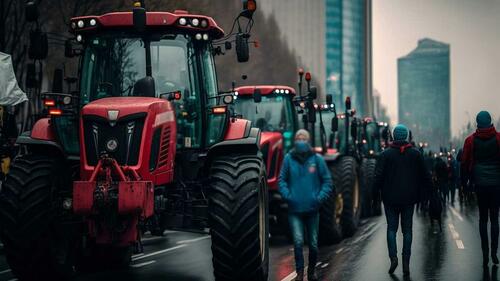
Farmer protests have exploded in multiple different countries against the EU’s green agenda and the flooding of markets with cheap grain from Ukraine, which is bankrupting the agricultural industry.
While the EU continues to pour millions of euros into Ukraine to prop up their economy, European farmers have been hit with tax hikes and emissions caps that threaten to destroy their livelihoods.
They cannot compete with the cheap price of imported Ukraine grain and in some cases are being ordered not to farm at all.
In France, there is a farmer suicide every other day as the EU deploys high-tech surveillance drones as a tool of enforcement which in some cases means the farmers cannot even cut back bushes and hedgerows without permission.
R/T 9:13
View: https://youtu.be/Z3M6XLhTZjU
In Poland, the Trade Union of Individual Farmers said, “Our patience has run out” as they announced a general strike across the whole country.
“We ask our compatriots for understanding and awareness of the situation we all find ourselves in. We are fighting for our common good, which is to prevent the collapse and bankruptcy of Polish family farms, often multi-generational. Where possible, we ask to avoid travel in the affected areas,” the group stated.
From February 9, farmers will launch a blockade of all Polish border crossings with Ukraine, as well as highway blockades in numerous provinces.
“The situation is exacerbated by alarming statements from Brussels,” reports Remix News.
“The European Union will need €1.5 trillion per year in investments to achieve its net-zero emissions goal by 2050, according to research supported by EU lawmakers, as reported by Reuters. This week, the European Commission is expected to recommend that the EU reduce its net emissions by 90 percent by 2040 compared to 1990 levels; it will also outline a massive increase in investments needed to set Europe on the path to achieving zero net emissions by 2050.”
Another organization of farmers already blocked a key border crossing with Ukraine although they backed down after their demands were met.
Polish Farmers Set To Join European Revolt With Mass Blockade | ZeroHedge
ZeroHedge - On a long enough timeline, the survival rate for everyone drops to zero
Polish Farmers Set To Join European Revolt With Mass Blockade
BY TYLER DURDEN
WEDNESDAY, FEB 07, 2024 - 02:00 AM
Authored by Paul Joseph Watson via Modernity.news,
Polish farmers are set to join the continent-wide revolt against the EU by launching a massive nationwide strike and blockade later this week.

Farmer protests have exploded in multiple different countries against the EU’s green agenda and the flooding of markets with cheap grain from Ukraine, which is bankrupting the agricultural industry.
While the EU continues to pour millions of euros into Ukraine to prop up their economy, European farmers have been hit with tax hikes and emissions caps that threaten to destroy their livelihoods.
They cannot compete with the cheap price of imported Ukraine grain and in some cases are being ordered not to farm at all.
In France, there is a farmer suicide every other day as the EU deploys high-tech surveillance drones as a tool of enforcement which in some cases means the farmers cannot even cut back bushes and hedgerows without permission.
R/T 9:13
In Poland, the Trade Union of Individual Farmers said, “Our patience has run out” as they announced a general strike across the whole country.
“We ask our compatriots for understanding and awareness of the situation we all find ourselves in. We are fighting for our common good, which is to prevent the collapse and bankruptcy of Polish family farms, often multi-generational. Where possible, we ask to avoid travel in the affected areas,” the group stated.
From February 9, farmers will launch a blockade of all Polish border crossings with Ukraine, as well as highway blockades in numerous provinces.
“The situation is exacerbated by alarming statements from Brussels,” reports Remix News.
“The European Union will need €1.5 trillion per year in investments to achieve its net-zero emissions goal by 2050, according to research supported by EU lawmakers, as reported by Reuters. This week, the European Commission is expected to recommend that the EU reduce its net emissions by 90 percent by 2040 compared to 1990 levels; it will also outline a massive increase in investments needed to set Europe on the path to achieving zero net emissions by 2050.”
Another organization of farmers already blocked a key border crossing with Ukraine although they backed down after their demands were met.
Melodi
Disaster Cat
This is a large movement, and it just keeps getting bigger. A serious issue is that the local farmers know they are being replaced. People won't stop eating or even be forced to Eat Ze Bugs immediately; instead, the food gets imported from places without regulation. The Polish farmers are fed up with the food being brought in from the Ukraine and sold at fire sale prices because of the war. They tolerated it for one season when it was an emergency, but now that the war is dragging on, they won't let intentional price undercutting by Ukraine continue if they can help it.
It isn't even that most farmers are against everything being suggested, for example, reducing pesticides, especially stuff like Round Up clones. They object to targets that try to do it so quickly and with no alternatives that they simply can't comply. The only way to "comply" is to go out of business, which sometimes seems to be the point.
They are also sick of policies being made in Brussels as a one-size-fits-all approach. When farming throughout Europe is quite local, local concerns are simply being run over with a bulldozer.
It isn't even that most farmers are against everything being suggested, for example, reducing pesticides, especially stuff like Round Up clones. They object to targets that try to do it so quickly and with no alternatives that they simply can't comply. The only way to "comply" is to go out of business, which sometimes seems to be the point.
They are also sick of policies being made in Brussels as a one-size-fits-all approach. When farming throughout Europe is quite local, local concerns are simply being run over with a bulldozer.
Plain Jane
Just Plain Jane
There is a real disconnect with reality going on or the horrible consequences are actually intended. Only decades ago farming and the well being of farmers was considered to be a national security issue. I'm sure that goes back for as long as there were human communities, millenia. That deeply ingrained human need was supplanted by ideology and profit motive after the Cold War ended.serious issue is that the local farmers know they are being replaced. People won't stop eating or even be forced to Eat Ze Bugs immediately; instead, the food gets imported from places without regulation.
blueinterceptor
Veteran Member
Needs more pitchforks
energy_wave
Has No Life - Lives on TB
Centralized government just like the CCP.They are also sick of policies being made in Brussels as a one-size-fits-all approach. When farming throughout Europe is quite local, local concerns are simply being run over with a bulldozer.
Plain Jane
Just Plain Jane
Cacheman
Ultra MAGA!
Hoping this is accurate...
BREAKING: The EU have surrendered to the farmers
1. Dropping its 30% reduction target on emissions from farming
2. Reversing unrealistic pesticide quotas
3. Allowing more land for agricultural use
4. Agreeing to stop telling EU citizens to eat less meat
View: https://twitter.com/WallStreetSilv/status/1755334094508917186
BREAKING: The EU have surrendered to the farmers
1. Dropping its 30% reduction target on emissions from farming
2. Reversing unrealistic pesticide quotas
3. Allowing more land for agricultural use
4. Agreeing to stop telling EU citizens to eat less meat
View: https://twitter.com/WallStreetSilv/status/1755334094508917186
Plain Jane
Just Plain Jane
Accurate but according to this it's only a draft. I'm not sure that I trust it.Hoping this is accurate...
EU Bends The Knee To Farmers: Drops Key Provisions In 2040 Climate Proposal | ZeroHedge
ZeroHedge - On a long enough timeline, the survival rate for everyone drops to zero
EU Bends The Knee To Farmers: Drops Key Provisions In 2040 Climate Proposal
BY TYLER DURDEN
FRIDAY, FEB 09, 2024 - 04:15 AM
The European Commission has bent the knee to protesting farmers - and is dropping key passages in a proposal for a new 2040 goal aimed at cutting greenhouse gas pollution.

According to the EU exeuctive's plan, "all sectors" need to now contribute to the effort - but the previously mandated 30% cut to agricultural production between by 2040 is gone. The revised draft has also excluded a mandate for citizens to make lifestyle changes - such as eating less meat, and a push to end fossil fuel subsidies, Politico reports.
"We need to make sure we have a balanced approach," said European Commission Wopke Hoekstra, who unveiled the revised proposal. "The vast majority of our citizens sees the effects of climate change, does want protection, but is also worried about what that implies for their livelihood."Farmers' protests have broken out in many countries across Europe in recent weeks, with the industry expressing discontent over the EU’s green policies. Some of the largest demonstrations have been in Germany, prompted by a cut to diesel subsidies. Brussels has faced calls from industry groups and some political parties to lay out a 2040 climate pathway that doesn’t ignite further anger.
The EU's plan is set to be presented on Tuesday and will recommend a 90 percent cut in total EU emissions by 2040 from 1990 levels — a suggestion in line with scientific advice.
The updated version of the plan, which is still subject to change, framed agriculture in a more positive light compared to earlier drafts. The role the sector plays in the EU’s “food sovereignty” was also emphasized.
Meanwhile, the BBC reports that the EU has also scrapped plans to cut pesticide use in half across the EU - which was to take effect by 2030 as part of the so-called "Green Deal."
The changes were spearheaded by the powerful center-right European People's Party (EPP), the political family of top EU executive Ursula Von der Leyen, and constitutes the EU Parliament's largest group.
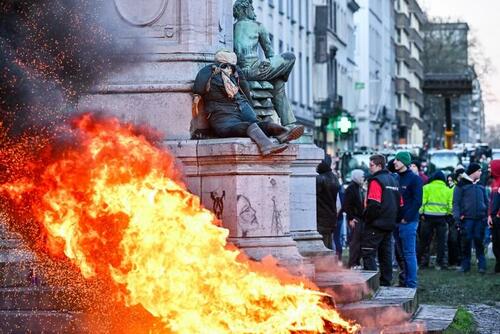
"Our farmers deserve to be listened to," said Von der Leyen in a Tuesday meeting of Parliament. "I know that they are worried about the future of agriculture and their future as farmers."
EPP environmental spokesman Peter Liese said on Monday that the 2040 target for a 90% cut over 1990 levels was conditional on greater emphasis being placed on "positive opportunities" for farmers, and less on "new instruments that rather see the farmers as an enemy of climate policy."
That said, one EU official told Politico that reality is hard to escape - which is that the agricultural sector 'could and should' contribute to the EU's climate goals.
"Despite all the semantics in the [Commission], there is an unequivocal Impact Assessment making a very compelling (business) case for an ambitious headline target and all sub-targets for sectors," said the official.
Plain Jane
Just Plain Jane
Yep, the farmers don't think that the reforms go far enough.
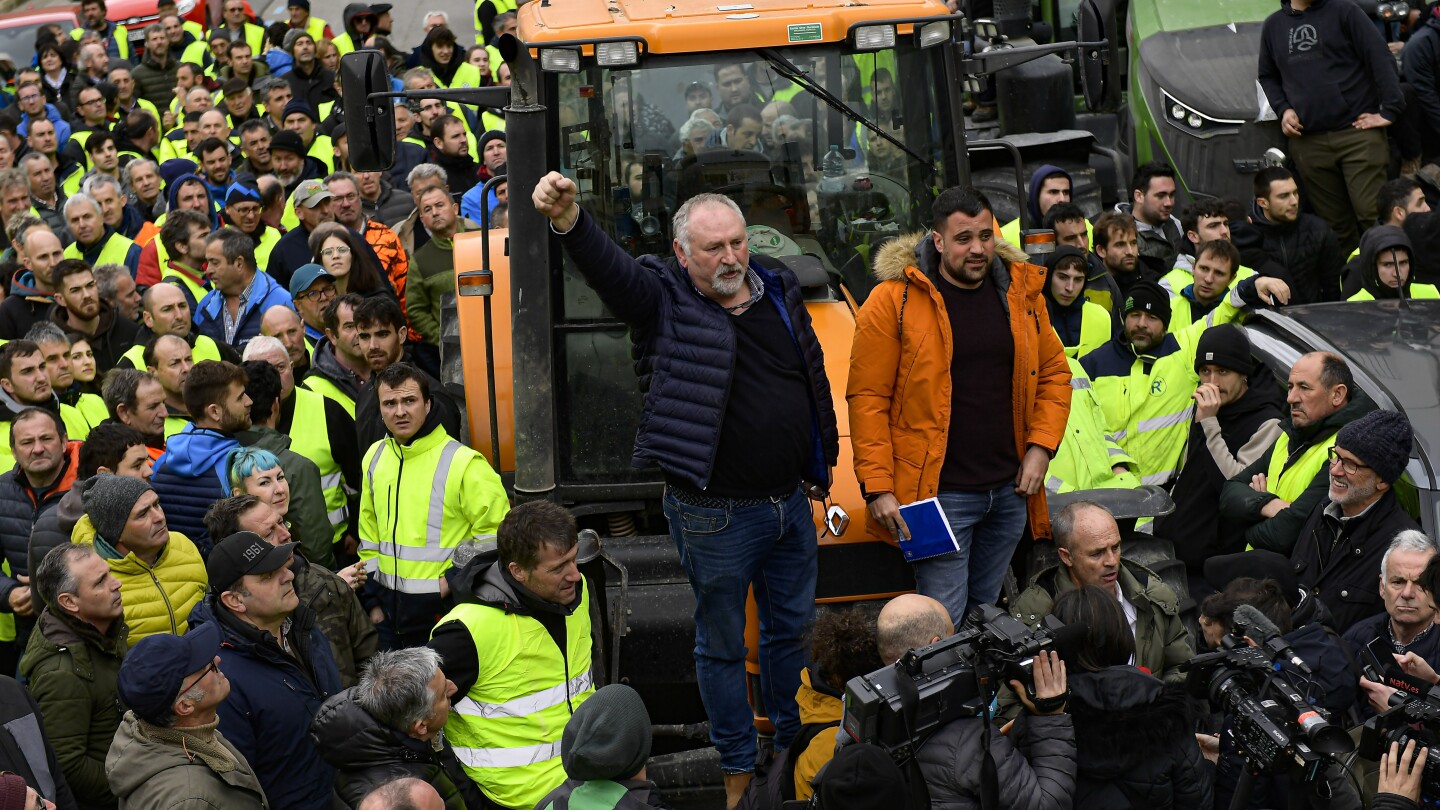
 apnews.com
apnews.com
BY CIARÁN GILES AND MONIKA SCISLOWSKA
Updated 4:06 PM EST, February 9, 2024
Share
MADRID (AP) — Farmers in Italy, Spain and Poland demonstrated Friday as part of ongoing protests against European Union farming policies and to demand measures to combat production cost hikes, reduced profits and unfair competition from non-EU countries.
Similar protests have taken place across the bloc in recent weeks. Farmers complain that the 27-nation EU’s policies on the environment and other matters are a financial burden and make their products more expensive than non-EU imports.
The European Commission, the EU’s executive arm, has made some concessions over the last few weeks, including shelving plans to halve the use of pesticides and other dangerous substances. Nonetheless, the protests have spread.
In Poland, where imports of cheap grain, milk and other produce from Ukraine have caused particular anger, farmers drove tractors across the country to slow down traffic and block major roads, some displaying signs that read “EU Policy is Ruining Polish Farmers.”
Access roads to border crossings with Ukraine in Hrebenne and Dorohusk, in the east, were temporarily blocked.
In the western city of Poznan, the police estimated that some 1,400 tractors entered the streets and reached the office of the regional governor. Protesters lit flares there and placed a coffin, symbolizing the death of Polish agriculture, as well as a manure-filled wheelbarrow with a EU flag stuck in it. There was no violence reported.
Deputy Prime Minister Wladyslaw Kosiniak-Kamysz as well as the opposition leader called on the EU commissioner for agriculture, Janusz Wojciechowski, Poland’s former agriculture minister, to resign. Wojciechowski reacted by saying he “will not act under pressure.”
The organizers, the Solidarity Union of Individual Farmers, said EU policies triggered the protest.
They said storage warehouses were filled with Ukraine grain, causing prices to fall 40% in 2023. Demand for Polish sugar, milk and meat has fallen: as a result, farmers are holding off on investments.
Farmers are also concerned that the EU’s Green Deal, which calls for limits on the use of chemicals and on greenhouse gas emissions, will result in a reduction in production and income.
In Italy, a small convoy of tractors moved across Rome’s historical center to the Colosseum on Friday morning, escorted by police patrols.
Farmers have been peacefully protesting outside of Rome and across the country for days to express their discontent.
Italy’s Premier Giorgia Meloni has repeatedly said that her right-wing government has already addressed some of the farmers’ key requests, but many of them feel neglected.
Meloni stressed that her government has already earmarked an extra 3 billion euros from the Italian chunk of EU’s post-pandemic recovery funds, raising total resources dedicated to the agricultural sector to 8 billion euros.
On Friday afternoon, at a roundtable with her ministers and some delegates of the main agricultural associations — not including representatives of the protests — the Italian premier also agreed to extend an income tax exemption for farmers in force since 2017, but only for low-income earners.
Many Italian farmers, however, complain they don’t feel represented by large sector associations, which they say are removed from their daily struggles.
Later on Friday, a few protest representatives met separately with Agriculture Minister Francesco Lollobrigida, but that move didn’t stop a new convoy of hundreds of tractors from starting a procession on Rome’s main motorway ring road.
Farmers in Spain staged similar actions in their fourth straight day of protests.
Besides EU policies, Spanish farmers maintain that a law aimed at guaranteeing that wholesale major supermarket buyers pay fair prices for their goods isn’t being enforced while consumer prices soar.
Friday’s protests centered around the northern cities of Oviedo, Pamplona and Zaragoza, with tractors clogging several city streets and commuter roads. In many places, farmers kept their protests going overnight.
A group not affiliated with Spain’s three main farming organizations has called for farmers to move on Madrid at midnight for a Saturday protest near the headquarters of Prime Minister Pedro Sánchez’s Socialist party.
The demonstrations are expected to continue over the coming weeks with a major protest being organized in the capital for Feb. 21.
Several Spanish media reports have linked many of the protests to conservative and hard-right groups.
Police said that 20 people have been arrested during this week’s demonstrations.
Farmers in Italy, Spain and Poland protest over European Union policies and competition
Farmers in Italy, Spain and Poland are demonstrating as part of ongoing protests against European Union farming policies and to demand measures to combat production cost hikes, reduced profits and unfair competition from non-EU countries.
Farmers in Italy, Spain and Poland protest over European Union policies and competition
BY CIARÁN GILES AND MONIKA SCISLOWSKA
Updated 4:06 PM EST, February 9, 2024
Share
MADRID (AP) — Farmers in Italy, Spain and Poland demonstrated Friday as part of ongoing protests against European Union farming policies and to demand measures to combat production cost hikes, reduced profits and unfair competition from non-EU countries.
Similar protests have taken place across the bloc in recent weeks. Farmers complain that the 27-nation EU’s policies on the environment and other matters are a financial burden and make their products more expensive than non-EU imports.
The European Commission, the EU’s executive arm, has made some concessions over the last few weeks, including shelving plans to halve the use of pesticides and other dangerous substances. Nonetheless, the protests have spread.
In Poland, where imports of cheap grain, milk and other produce from Ukraine have caused particular anger, farmers drove tractors across the country to slow down traffic and block major roads, some displaying signs that read “EU Policy is Ruining Polish Farmers.”
Access roads to border crossings with Ukraine in Hrebenne and Dorohusk, in the east, were temporarily blocked.
In the western city of Poznan, the police estimated that some 1,400 tractors entered the streets and reached the office of the regional governor. Protesters lit flares there and placed a coffin, symbolizing the death of Polish agriculture, as well as a manure-filled wheelbarrow with a EU flag stuck in it. There was no violence reported.
Deputy Prime Minister Wladyslaw Kosiniak-Kamysz as well as the opposition leader called on the EU commissioner for agriculture, Janusz Wojciechowski, Poland’s former agriculture minister, to resign. Wojciechowski reacted by saying he “will not act under pressure.”
The organizers, the Solidarity Union of Individual Farmers, said EU policies triggered the protest.
They said storage warehouses were filled with Ukraine grain, causing prices to fall 40% in 2023. Demand for Polish sugar, milk and meat has fallen: as a result, farmers are holding off on investments.
Farmers are also concerned that the EU’s Green Deal, which calls for limits on the use of chemicals and on greenhouse gas emissions, will result in a reduction in production and income.
In Italy, a small convoy of tractors moved across Rome’s historical center to the Colosseum on Friday morning, escorted by police patrols.
Farmers have been peacefully protesting outside of Rome and across the country for days to express their discontent.
Italy’s Premier Giorgia Meloni has repeatedly said that her right-wing government has already addressed some of the farmers’ key requests, but many of them feel neglected.
Meloni stressed that her government has already earmarked an extra 3 billion euros from the Italian chunk of EU’s post-pandemic recovery funds, raising total resources dedicated to the agricultural sector to 8 billion euros.
On Friday afternoon, at a roundtable with her ministers and some delegates of the main agricultural associations — not including representatives of the protests — the Italian premier also agreed to extend an income tax exemption for farmers in force since 2017, but only for low-income earners.
Many Italian farmers, however, complain they don’t feel represented by large sector associations, which they say are removed from their daily struggles.
Later on Friday, a few protest representatives met separately with Agriculture Minister Francesco Lollobrigida, but that move didn’t stop a new convoy of hundreds of tractors from starting a procession on Rome’s main motorway ring road.
Farmers in Spain staged similar actions in their fourth straight day of protests.
Besides EU policies, Spanish farmers maintain that a law aimed at guaranteeing that wholesale major supermarket buyers pay fair prices for their goods isn’t being enforced while consumer prices soar.
Friday’s protests centered around the northern cities of Oviedo, Pamplona and Zaragoza, with tractors clogging several city streets and commuter roads. In many places, farmers kept their protests going overnight.
A group not affiliated with Spain’s three main farming organizations has called for farmers to move on Madrid at midnight for a Saturday protest near the headquarters of Prime Minister Pedro Sánchez’s Socialist party.
The demonstrations are expected to continue over the coming weeks with a major protest being organized in the capital for Feb. 21.
Several Spanish media reports have linked many of the protests to conservative and hard-right groups.
Police said that 20 people have been arrested during this week’s demonstrations.
___
Scislowska reported from Warsaw, Poland, and Giada Zampano from Rome.Plain Jane
Just Plain Jane
The New protests in Poland had begun.
 www.zerohedge.com
www.zerohedge.com
BY TYLER DURDEN
SATURDAY, FEB 10, 2024 - 09:55 AM
While the EU caved earlier this week to demands that they drop key climate provisions and punitive taxes aimed at cutting greenhouse gas pollution, Polish farmers on Friday launched a series of protests against EU climate policies as well as the economic prioritization of cheap Ukrainian imports over their own.
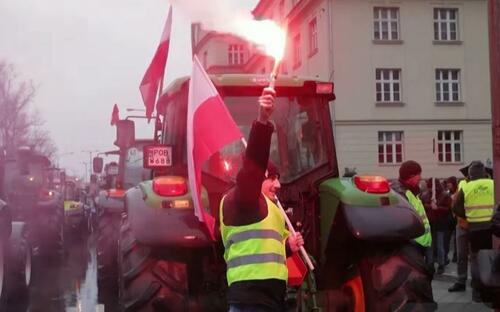
The strike, scheduled to last around 30 days, will include more of what we've seen across Europe over the past month; blocked roads, protests at government offices, and likely clashes with the police.
There have been more than 250 protests scheduled around the country, which began at 10 a.m. local time on Friday by farmers who say their "patience has run out," according to Notes from Poland.
"We have no other choice," said Marcin Wilgos, an organiser of the protest in Dorohusk at the border with Ukraine, in a statement to AFP, while standing next to a banner demanding that the EU ban Ukrainian grain and sugar.
According to Poland's farmers’ trade union "Our patience has run out. Brussels’ position on the last day of January 2024 is unacceptable for our entire agricultural community," adding "Additionally, the passivity of the Polish authorities... regarding the import of agricultural produce and food products from Ukraine leave us with no other choice but to declare a general strike."
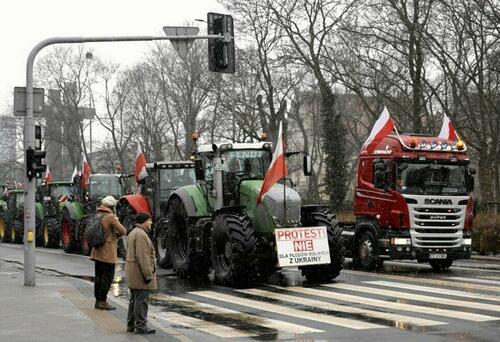
The farmers also called for the easing of 'green' requirements introduced by the EU, as well as those included in the bloc's upcoming Green Deal.
"They're talking about climate protection. But why should it be done at farmers' expense?" said 62-year-old farmer Janusz Bialoskorski, protesting in Poznan, northwest Poland. "We do not produce plastics polluting the oceans, we do not build cruise ships that pollute the environment nor do we fly to Davos on our jets."
As AFP reports further:
R/T 1:35
View: https://youtu.be/VV1aGWeTSCA
"The glut of products from Ukraine, produced not in accordance with EU standards and procedures, is a huge burden for us," said Wilgos.
"We Have No Other Choice": Pissed Off Polish Farmers Launch 30-Day Protest Across Country, Ukraine Border Crossings | ZeroHedge
ZeroHedge - On a long enough timeline, the survival rate for everyone drops to zero
"We Have No Other Choice": Pissed Off Polish Farmers Launch 30-Day Protest Across Country, Ukraine Border Crossings
BY TYLER DURDEN
SATURDAY, FEB 10, 2024 - 09:55 AM
While the EU caved earlier this week to demands that they drop key climate provisions and punitive taxes aimed at cutting greenhouse gas pollution, Polish farmers on Friday launched a series of protests against EU climate policies as well as the economic prioritization of cheap Ukrainian imports over their own.

The strike, scheduled to last around 30 days, will include more of what we've seen across Europe over the past month; blocked roads, protests at government offices, and likely clashes with the police.
There have been more than 250 protests scheduled around the country, which began at 10 a.m. local time on Friday by farmers who say their "patience has run out," according to Notes from Poland.
"We have no other choice," said Marcin Wilgos, an organiser of the protest in Dorohusk at the border with Ukraine, in a statement to AFP, while standing next to a banner demanding that the EU ban Ukrainian grain and sugar.
According to Poland's farmers’ trade union "Our patience has run out. Brussels’ position on the last day of January 2024 is unacceptable for our entire agricultural community," adding "Additionally, the passivity of the Polish authorities... regarding the import of agricultural produce and food products from Ukraine leave us with no other choice but to declare a general strike."

The farmers also called for the easing of 'green' requirements introduced by the EU, as well as those included in the bloc's upcoming Green Deal.
"They're talking about climate protection. But why should it be done at farmers' expense?" said 62-year-old farmer Janusz Bialoskorski, protesting in Poznan, northwest Poland. "We do not produce plastics polluting the oceans, we do not build cruise ships that pollute the environment nor do we fly to Davos on our jets."
As AFP reports further:
According to Polish farmers, competition from Ukraine has crushed their earnings, as Ukrainian producers are not required to adhere to EU rules on regulations such as animal welfare.The protests came shortly after Polish truckers staged a two-month blockade of major border crossings to demand the reintroduction of restrictions to enter the EU for their Ukrainian competitors.
The hauliers have suspended the blockade until March but warned they will return to the border if their demands are not met.
Poland has been among Ukraine's staunchest supporters during Russia's nearly two-year invasion, but frictions over grain import restrictions introduced by Poland and four other EU countries in June have further strained ties between the allies.
Polish Agriculture Minister Czeslaw Siekierski told state radio on Friday that "complete" bans on imports could be imposed on other groups of products as well.
"It may be needed for sugar, if the influx is too large. It may be needed for poultry," Siekierski said, adding that the government intended to raise the issue in talks with Kyiv.
Asked about the protests, Siekierski said the farmers had "legitimate expectations and demands" to limit imports from Ukraine, which farmers say are unfairly driving down prices.
R/T 1:35
"The glut of products from Ukraine, produced not in accordance with EU standards and procedures, is a huge burden for us," said Wilgos.
Plain Jane
Just Plain Jane
This guy is new to me and he is reporting on the situation in the UK. Apparently Scotland and Wales have been having farmers protests and no one was reporting on it. Now the English farmers are joining them.
R/T 28:26

 www.youtube.com
www.youtube.com
R/T 28:26

LIVE: English Farmers RISE UP Against Globalism
Become a member of Tousi TV to get access to more exclusive content https://tousitv.locals.comSupport Mahyar via PayPal: http://paypal.me/mahyartousi88Get...
Melodi
Disaster Cat
An observation made by a few people is when the MPs (members of the EU Parliament) were meeting in Brussels a couple of weeks ago, the crowds of farmers protesting were so huge that they could efficiently have run over any attempts to stop them if they had decided to go rogue and break into the building for real.
As a friend with military training told me: "That's when it goes from riot to a real insurrection or revolution." Thankfully, things are still too "normal" for a repeat of the storming of the Bastille or The Palace itself. But that was pretty much the only thing keeping that incident from being a massacre, probably on both sides.
Even the CCP in China knows there is only so much anger they can deal with in their population (from an interview done in the late 1980s when things were still very bad there). Europeans (and Americans, all of the Americas) tend to have a much lower tolerance for such things unless they are convinced they are required, such as during wartime.
The US and some of the European countries have tried very hard to play up the wartime aspect, even trying for "A War on Climate Change," which is failing spectacularly to the point where some things that are good ideas may get dumped for a time, along with more radical ones that are both impractical and even potentially deadly.
As a friend with military training told me: "That's when it goes from riot to a real insurrection or revolution." Thankfully, things are still too "normal" for a repeat of the storming of the Bastille or The Palace itself. But that was pretty much the only thing keeping that incident from being a massacre, probably on both sides.
Even the CCP in China knows there is only so much anger they can deal with in their population (from an interview done in the late 1980s when things were still very bad there). Europeans (and Americans, all of the Americas) tend to have a much lower tolerance for such things unless they are convinced they are required, such as during wartime.
The US and some of the European countries have tried very hard to play up the wartime aspect, even trying for "A War on Climate Change," which is failing spectacularly to the point where some things that are good ideas may get dumped for a time, along with more radical ones that are both impractical and even potentially deadly.
Orion Commander
Veteran Member
It's one thing to tax something that's a luxury or not absolutely necessary for life. But taxing something necessary for life aka food production is just plain stupid. You might as well say we are going to reduce the population to reduce climate change. Instead of just killing a lot of people we will starve them and let evolution take its course.This is not a left-wing protest therefore it will be ignored by the government and media same as every other non-left-wing protest anywhere in the west.
If it cannot be ignored then the government will crackdown on the protest arresting and dispersing the participants as we have seen in canada, france and the US (if need be seed the protests with violent antifa or other government quislings to justify the 'crackdown').
I wonder what the left-wing politicians would do if the farmers instead of protesting went on strike and ceased all farming operations?
Sounds like its revolution time for the Germans.
mzkitty
I give up.
Melodi
Disaster Cat
In parts of India, things have been monstrous for farmers. The governments of local States first encouraged the growing of GMO foods, which had to be paid for with yearly loans to the smaller peasant farmers (the majority). The only way to get out of producing such a loan was death. Otherwise, families were bankrupted and put on the streets.
When the GMO crops started to fail or failed to provide the promised increases in production (mostly they failed after a couple of years), farmers started committing suicide en mass, to the point where the National Government stepped in and suspended the use of GMO crops for a time.
Of course, that is being fought tooth and nail by various big corporate agricultural companies who want to sell the seeds again. Like the US, individual States in India have a certain amount of anatomy, and I think some may have started using the seeds again. How they will deal with the loan and suicide problem, I have no idea. But the Indian farmers have been sitting on a powder keg of anger over this for about a decade now.
When the GMO crops started to fail or failed to provide the promised increases in production (mostly they failed after a couple of years), farmers started committing suicide en mass, to the point where the National Government stepped in and suspended the use of GMO crops for a time.
Of course, that is being fought tooth and nail by various big corporate agricultural companies who want to sell the seeds again. Like the US, individual States in India have a certain amount of anatomy, and I think some may have started using the seeds again. How they will deal with the loan and suicide problem, I have no idea. But the Indian farmers have been sitting on a powder keg of anger over this for about a decade now.
Plain Jane
Just Plain Jane
This all reminds me of the debacle in Sri Lanka from a few years ago.
 www.timebomb2000.com
www.timebomb2000.com
FOOD - Sri Lanka faces ‘man-made’ food crisis as farmers stop planting
Sri Lanka faces ‘man-made’ food crisis as farmers stop planting Once self-sufficient nation reels from fall-out of ill-conceived shift to organic agriculture, compounded by fuel shortages. Mahinda Samarawickrema says his banana crop may fail because of a lack of chemical fertilisers [Zaheena...
Tristan
Has No Life - Lives on TB
It's one thing to tax something that's a luxury or not absolutely necessary for life. But taxing something necessary for life aka food production is just plain stupid. You might as well say we are going to reduce the population to reduce climate change. Instead of just killing a lot of people we will starve them and let evolution take its course.
Sounds like its revolution time for the Germans.
They can't say that part out loud.

